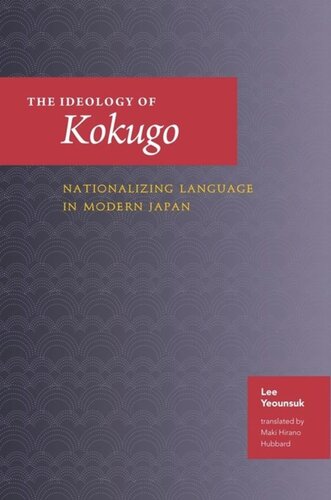

Most ebook files are in PDF format, so you can easily read them using various software such as Foxit Reader or directly on the Google Chrome browser.
Some ebook files are released by publishers in other formats such as .awz, .mobi, .epub, .fb2, etc. You may need to install specific software to read these formats on mobile/PC, such as Calibre.
Please read the tutorial at this link: https://ebookbell.com/faq
We offer FREE conversion to the popular formats you request; however, this may take some time. Therefore, right after payment, please email us, and we will try to provide the service as quickly as possible.
For some exceptional file formats or broken links (if any), please refrain from opening any disputes. Instead, email us first, and we will try to assist within a maximum of 6 hours.
EbookBell Team

4.0
76 reviewsAvailable for the first time in English, The Ideology of Kokugo: Nationalizing Language in Modern Japan (1996) is Lee Yeounsuk’s award-winning look at the history and ideology behind the construction of kokugo (national language). Prior to the Meiji Period (1868–1912), the idea of a single, unified Japanese language did not exist. Only as Japan was establishing itself as a modern nation-state and an empire with expanding colonies did there arise the need for a national language to construct and sustain its national identity.
Re-examining debates and controversies over genbun itchi (unification of written and spoken languages) and other language reform movements, Lee discusses the contributions of Ueda Kazutoshi (1867–1937) and Hoshina Koichi (1872–1955) in the creation of kokugo and moves us one step closer to understanding how the ideology of kokugo cast a spell over linguistic identity in modern Japan. She examines the notion of the unshakable homogeneity of the Japanese language—a belief born of the political climate of early-twentieth-century Japan and its colonization of other East Asian countries—urging us to pay attention to the linguistic consciousness that underlies "scientific" scholarship and language policies. Her critical discussion of the construction of kokugo uncovers a strain of cultural nationalism that has been long nurtured in Japan’s education system and academic traditions. The ideology of kokugo, argues Lee, must be recognized both as an academic apparatus and a political concept.
The Ideology of Kokugo was the first work to explore Japan’s linguistic consciousness at the dawn of its modernization. It will therefore be of interest to not only linguists, but also historians, anthropologists, political scientists, and scholars in the fields of education and cultural studies.